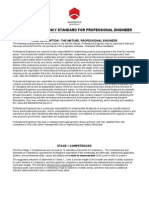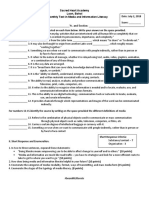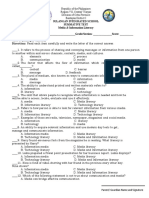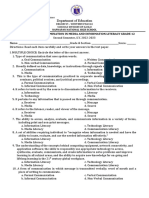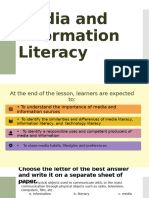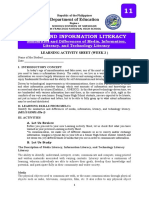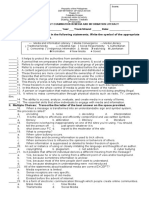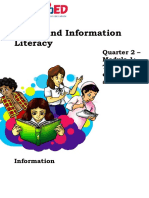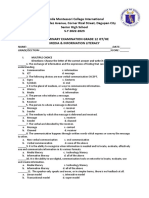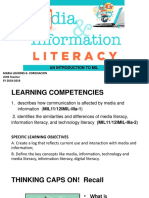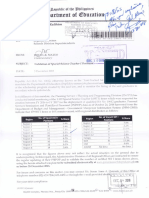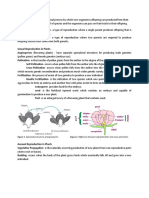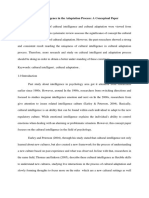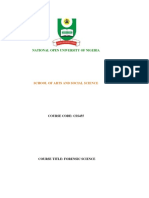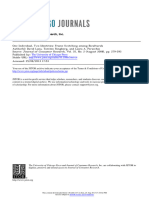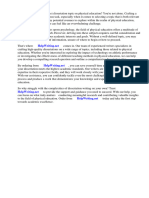0 ratings0% found this document useful (0 votes)
68 viewsFelix Amante Senior High School: Division of San Pablo City San Pablo City
Felix Amante Senior High School: Division of San Pablo City San Pablo City
Uploaded by
Kaye Ann Carel1. The document provides a quiz on concepts related to media analysis and information literacy. It tests the examinee's knowledge on various concepts through multiple choice and true/false questions.
2. The concepts covered in the quiz include media literacy, digital literacy, critical thinking, information literacy, communication models, and common logical fallacies.
3. The quiz directs the examinee to identify the letter of the correct answer for multiple choice questions and mark their answers for true/false questions about statements related to media analysis concepts.
Copyright:
© All Rights Reserved
Available Formats
Download as DOCX, PDF, TXT or read online from Scribd
Felix Amante Senior High School: Division of San Pablo City San Pablo City
Felix Amante Senior High School: Division of San Pablo City San Pablo City
Uploaded by
Kaye Ann Carel0 ratings0% found this document useful (0 votes)
68 views2 pages1. The document provides a quiz on concepts related to media analysis and information literacy. It tests the examinee's knowledge on various concepts through multiple choice and true/false questions.
2. The concepts covered in the quiz include media literacy, digital literacy, critical thinking, information literacy, communication models, and common logical fallacies.
3. The quiz directs the examinee to identify the letter of the correct answer for multiple choice questions and mark their answers for true/false questions about statements related to media analysis concepts.
Original Description:
MIL
Original Title
quiz_no.1
Copyright
© © All Rights Reserved
Available Formats
DOCX, PDF, TXT or read online from Scribd
Share this document
Did you find this document useful?
Is this content inappropriate?
1. The document provides a quiz on concepts related to media analysis and information literacy. It tests the examinee's knowledge on various concepts through multiple choice and true/false questions.
2. The concepts covered in the quiz include media literacy, digital literacy, critical thinking, information literacy, communication models, and common logical fallacies.
3. The quiz directs the examinee to identify the letter of the correct answer for multiple choice questions and mark their answers for true/false questions about statements related to media analysis concepts.
Copyright:
© All Rights Reserved
Available Formats
Download as DOCX, PDF, TXT or read online from Scribd
Download as docx, pdf, or txt
0 ratings0% found this document useful (0 votes)
68 views2 pagesFelix Amante Senior High School: Division of San Pablo City San Pablo City
Felix Amante Senior High School: Division of San Pablo City San Pablo City
Uploaded by
Kaye Ann Carel1. The document provides a quiz on concepts related to media analysis and information literacy. It tests the examinee's knowledge on various concepts through multiple choice and true/false questions.
2. The concepts covered in the quiz include media literacy, digital literacy, critical thinking, information literacy, communication models, and common logical fallacies.
3. The quiz directs the examinee to identify the letter of the correct answer for multiple choice questions and mark their answers for true/false questions about statements related to media analysis concepts.
Copyright:
© All Rights Reserved
Available Formats
Download as DOCX, PDF, TXT or read online from Scribd
Download as docx, pdf, or txt
You are on page 1of 2
DIVISION OF SAN PABLO CITY
FELIX AMANTE SENIOR HIGH SCHOOL
SAN PABLO CITY
Name:___________________________________________________ Teacher: __________________________________________
Grade & Section: _________________________________________ Date: _____________________________________________
Direction: Write the letter of the correct answer on the space provided before each number.
__G__1. The ability to access, analyze, evaluate, and create media in a variety of forms. It aims to empower citizens by
providing them with the competencies (knowledge and skills) necessary to engage with traditional media and new
technologies.
___F_2. The ability to identify, understand, interpret, create, communicate and compute, using printed and written materials
associated with varying contexts. It involves a continuum of learning, wherein individuals can achieve their goals, develop
their knowledge and potential, and participate fully in their community and wider society.
___Q_3. The ability to recognize when information is needed, and to locate, evaluate, and effectively communicate
information in its various formats.
__C__4. A broad term that covers processed data, knowledge derived from study, experience, instruction, signals or
symbols.
__N__5. The ability of an individual, either working independently or with others, to responsibly, appropriately, and
effectively use technological tools. Using these tools an individual can access, manage, integrate, evaluate, create and
communicate information.
__I__6. The essential skills and competencies that allow individuals to engage with media and other information providers
effectively, as well as develop critical thinking and life-long learning skills to socialize and become active citizens.
_M___7. The act or process of using words, sounds, signs, or behaviors to express or exchange information or to express
your ideas, thoughts, feelings, etc., to someone else.
__O__8. It includes every broadcasting and narrowcasting medium such as newspapers, magazines, TV, radio, billboards,
direct mail, telephone, fax, and internet.
__R__9. It is one of the characteristics of a Media and Information Literate individual which respects other users’ views and
displaying common courtesy when posting views to online discussion groups.
__A__10. The process that diminishes emotional responsiveness to a negative stimulus after repeated exposure to it.
__B__11. The intellectually disciplined process of actively and skillfully conceptualizing, applying, analyzing, synthesizing,
and/or evaluating information gathered from, or generated by, observation, experience, reflection, reasoning, or
communication, as a guide to belief and action.
__H__12. It is one of the logical fallacies where two alternatives are presented as the only possibilities, when in fact more
possibilities exist.
__J__13. It is one of the logical fallacies which ask a question that has an assumption built into it so that it can’t be
answered without appearing guilty.
__L__14. It is one of the logical fallacies which assume about one part of something must be applied to all or other parts of
it.
__E__15. It is one of the logical fallacies which appeals to popularity or the fact that many people do something as an
attempted form of validation.
a. Desensitization h. Black or white n. Digital literacy
b. Critical thinking i. Media and Information o. Media
c. Information Literacy p. Communication models
d. Digital Technology j. Composition q. Information Literacy
e. Bandwagon k. Ad Hominem r. Netiquette
f. Literacy l. Loaded question
g. Media Literacy m. Communication
Identify if the statement is correct about the concepts in media analysis, write TRUE if the statement is correct and FALSE if
the statement is incorrect.
_____T______16. People use their individual skills, beliefs and experiences to construct their own meanings from media messages.
_____T______17. Each medium has different characteristics, strengths, and a unique “language” of construction.
______T_____18. All media messages contain embedded values and points of view.
_______F____19. Media and media messages can influence beliefs, attitudes, values, behaviors, and the economic process.
________T___20. All media messages are “constructed.”
ILLUSTRATION
Choose one example of the communication models and illustrate its components and process. (10pts.)
You might also like
- Fear and Hunger TRPGDocument65 pagesFear and Hunger TRPGEmo Funkero100% (2)
- Media and Information Literacy Grade 12 Long Quiz Module 1Document2 pagesMedia and Information Literacy Grade 12 Long Quiz Module 1Imie Omamalin Guisehan88% (49)
- MIL Midterm ExamDocument2 pagesMIL Midterm ExamVivien Leigh LopezNo ratings yet
- Media and Information Literacy Grade 12 Long Quiz Module 1Document2 pagesMedia and Information Literacy Grade 12 Long Quiz Module 1Gian C. Guzman100% (2)
- Stage 1 Professional Engineer SummaryDocument6 pagesStage 1 Professional Engineer SummaryMoheb MakarNo ratings yet
- Final Exam MilDocument4 pagesFinal Exam MilJoshua CondeNo ratings yet
- Name: - Yr. and SectionDocument1 pageName: - Yr. and SectionNiño Jay C. GastonesNo ratings yet
- Summative Test Number 1 - Quarter 1Document7 pagesSummative Test Number 1 - Quarter 1bryl john lawrence villamarNo ratings yet
- Summative MILDocument3 pagesSummative MILAntonio SearesNo ratings yet
- MIL Week1 Information-SheetDocument12 pagesMIL Week1 Information-SheetPrince Adrian RelojNo ratings yet
- Mil-Summative 2Document2 pagesMil-Summative 2Alexis IgnacioNo ratings yet
- Grade 12 MIL 3rd QTRDocument2 pagesGrade 12 MIL 3rd QTRCHERILYN TANTIADONo ratings yet
- Media and Information Literacy - G11: Quarter 3 - Week 2Document8 pagesMedia and Information Literacy - G11: Quarter 3 - Week 2wiz wizNo ratings yet
- Media and Information Literacy Quiz #1Document3 pagesMedia and Information Literacy Quiz #1Rolando Corado Rama Gomez Jr.No ratings yet
- Media and Information Technology: Department of EducationDocument16 pagesMedia and Information Technology: Department of EducationMatt Gabriel LacierdaNo ratings yet
- MIL - Module 2Document9 pagesMIL - Module 2France PotterNo ratings yet
- Pre-Test in MIL Q1 M1Document1 pagePre-Test in MIL Q1 M1Melben ResurreccionNo ratings yet
- LM Ict Computer 10 3rd Q 1Document21 pagesLM Ict Computer 10 3rd Q 1artemio061108No ratings yet
- Introduction To Media and Information LiteracyDocument13 pagesIntroduction To Media and Information LiteracyJoiemmy Sumedca Bawengan GayudanNo ratings yet
- Media and Information Literacy Practice TestDocument2 pagesMedia and Information Literacy Practice TestSonny B. NabazaNo ratings yet
- Week 1Document22 pagesWeek 1gabrellemarieogayonNo ratings yet
- MIL LAS Q3 Wk2 MELC2Document6 pagesMIL LAS Q3 Wk2 MELC2williamson.enocNo ratings yet
- 1 12 Module in Mil 11 Quarter 1 Melc 2, FinalDocument10 pages1 12 Module in Mil 11 Quarter 1 Melc 2, Finaljenny feNo ratings yet
- Mil 1Document11 pagesMil 1Jean Crishia Melencio CorumNo ratings yet
- Media and Information Literacy: Department of EducationDocument4 pagesMedia and Information Literacy: Department of EducationLea NovelaNo ratings yet
- Mil Q2 Module2-FinalDocument18 pagesMil Q2 Module2-FinalJethroel Am-is100% (2)
- Portfolio Entry No AndaquigDocument4 pagesPortfolio Entry No AndaquigMarianne Angelica AndaquigNo ratings yet
- Interactive FOR Media Information LiteracyDocument7 pagesInteractive FOR Media Information LiteracyJoel Cabusao Lacay100% (1)
- Test QuestionsDocument11 pagesTest QuestionsAbastar Kycie BebNo ratings yet
- MIL SummativeDocument3 pagesMIL SummativeRamlede Benosa100% (2)
- Module-1 Mil First-Quarter FinalDocument23 pagesModule-1 Mil First-Quarter FinalSarah Jean Formentera - Paring83% (6)
- Q2 SHS MIL Module 1Document17 pagesQ2 SHS MIL Module 1Sophia Egos100% (2)
- Preliminary Exam Mil ShsDocument2 pagesPreliminary Exam Mil ShsJoshua CondeNo ratings yet
- qtr1 Qui 2Document18 pagesqtr1 Qui 2JenniferNo ratings yet
- Additional ActivitiesDocument3 pagesAdditional ActivitiesMar SebastianNo ratings yet
- MIL Quiz#1Document1 pageMIL Quiz#1Catherine BotardoNo ratings yet
- Exam 4thQ DIASSDocument3 pagesExam 4thQ DIASSROVELYN BOSINo ratings yet
- Media-And-Information-Literacy Mil12 Q3 M1Document14 pagesMedia-And-Information-Literacy Mil12 Q3 M1benedictdagundonNo ratings yet
- MIL 1st ExamDocument4 pagesMIL 1st ExamJuliane Rebecca PitlongayNo ratings yet
- MIL 11-Q1-LAS 1 Part 1Document4 pagesMIL 11-Q1-LAS 1 Part 1John Nathaniel BarredaNo ratings yet
- Week 3 Media and Information LiteracyDocument13 pagesWeek 3 Media and Information Literacymaxene jadeNo ratings yet
- Media and Information Literacy Virtual ExaminationDocument17 pagesMedia and Information Literacy Virtual ExaminationMam Elaine AgbuyaNo ratings yet
- MIL-Answer Sheets Sheet 1ST QUARTER (WEEK 1-4)Document8 pagesMIL-Answer Sheets Sheet 1ST QUARTER (WEEK 1-4)Sheena Mae PeraltaNo ratings yet
- Mil Las 2 and 3 QuestionnaireDocument5 pagesMil Las 2 and 3 QuestionnairekarljoshuabelawanNo ratings yet
- An Introduction To Mil: Maria Lourdes G. Coronacion LSHS Teacher SY 2018-2019Document28 pagesAn Introduction To Mil: Maria Lourdes G. Coronacion LSHS Teacher SY 2018-2019petor fiegelNo ratings yet
- Mil TestDocument3 pagesMil TestNiña Romina G. Navalta100% (5)
- Q2 SHS MIL Module 1Document16 pagesQ2 SHS MIL Module 1Fyke CahiyangNo ratings yet
- Chapter Test Mil SchoologyDocument3 pagesChapter Test Mil SchoologyPaolo RenNo ratings yet
- Introduction To MilDocument29 pagesIntroduction To MilEmely FrancoNo ratings yet
- Summative TestDocument8 pagesSummative TestJessyNo ratings yet
- MIL Quarter 3 FinalDocument39 pagesMIL Quarter 3 FinalRoan Diraco100% (2)
- Second Semester First Quarterly Examination: Young Achievers' School of CaloocanDocument3 pagesSecond Semester First Quarterly Examination: Young Achievers' School of CaloocanJoseph PaoloNo ratings yet
- Media and Information Literate Individual LAS For Media and Information Literacy (Grade 12)Document3 pagesMedia and Information Literate Individual LAS For Media and Information Literacy (Grade 12)rosellerNo ratings yet
- SHS - Media Information Literacy - Q1 - Wk1 - Day3Document3 pagesSHS - Media Information Literacy - Q1 - Wk1 - Day3Janice Fuerzas Balmera CuragNo ratings yet
- Media and Information Literacy Module 1 Summative AssessmentDocument2 pagesMedia and Information Literacy Module 1 Summative Assessmentgrethel parreñoNo ratings yet
- The Description of Media Literacy, Information Literacy and Technology LiteracyDocument6 pagesThe Description of Media Literacy, Information Literacy and Technology LiteracyLea NovelaNo ratings yet
- Purposive Communication Final Exam 2nd Sem 2019Document5 pagesPurposive Communication Final Exam 2nd Sem 2019Ferdinand PiñonNo ratings yet
- Quijano ST., San Juan, San Ildefonso, BulacanDocument3 pagesQuijano ST., San Juan, San Ildefonso, BulacanJoice Dela CruzNo ratings yet
- Exam 4thQ DIASS SET ADocument3 pagesExam 4thQ DIASS SET AROVELYN BOSINo ratings yet
- Final Mil DoneDocument55 pagesFinal Mil DoneMariel Yeng Suing100% (1)
- Prelims MedlitDocument4 pagesPrelims MedlitShane BellenNo ratings yet
- Banana PeelDocument25 pagesBanana PeelKaye Ann CarelNo ratings yet
- I. Identification: Quiz 1: PEDocument2 pagesI. Identification: Quiz 1: PEKaye Ann Carel100% (1)
- Plant ReproductionDocument4 pagesPlant ReproductionKaye Ann CarelNo ratings yet
- Figure 1. Specialized Structure of Angiosperms Figure 2. Difference Between Self-Pollination and Cross PollinationDocument2 pagesFigure 1. Specialized Structure of Angiosperms Figure 2. Difference Between Self-Pollination and Cross PollinationKaye Ann CarelNo ratings yet
- K 12 Transitions Approaches LessonsDocument3 pagesK 12 Transitions Approaches LessonsKaye Ann CarelNo ratings yet
- Name: Section: Multiple Choice. Write The Correct LetterDocument2 pagesName: Section: Multiple Choice. Write The Correct LetterKaye Ann CarelNo ratings yet
- TeachingDocument42 pagesTeachingKaye Ann CarelNo ratings yet
- Win Mikaella Bartolome: Winmikaellabartolome@gmailDocument4 pagesWin Mikaella Bartolome: Winmikaellabartolome@gmailKaye Ann CarelNo ratings yet
- K 12 Transitions Approaches LessonsDocument1 pageK 12 Transitions Approaches LessonsKaye Ann CarelNo ratings yet
- OoseDocument83 pagesOosesuvejah18No ratings yet
- Aims and Objectives of Islamic EducationDocument12 pagesAims and Objectives of Islamic Educationstd105219No ratings yet
- Ethics Part 1 - 4 NotesDocument21 pagesEthics Part 1 - 4 NotesJoe SabalberinoNo ratings yet
- Obg Syllabus PDFDocument397 pagesObg Syllabus PDFajneshNo ratings yet
- Inquiry Based Learning and 5E Model InstructionDocument5 pagesInquiry Based Learning and 5E Model InstructionIRISH PEARL VERTUDAZONo ratings yet
- Cultural Intelligence in The Adaptation ProcessDocument12 pagesCultural Intelligence in The Adaptation ProcessNazirah Abdul RohmanNo ratings yet
- Codification TableDocument35 pagesCodification TableSanthosh KumarNo ratings yet
- Rationalism Vs EmpiricismDocument5 pagesRationalism Vs EmpiricismTan EXATNo ratings yet
- CSS 455 Forensic Science - 0Document311 pagesCSS 455 Forensic Science - 0Adeniyi Adedolapo OLanrewajuNo ratings yet
- Crim7 Module-1 CrimResearchDocument15 pagesCrim7 Module-1 CrimResearchJustin Jade AlmerezNo ratings yet
- CBLMDocument44 pagesCBLMivyjeanladlada20No ratings yet
- "An Investment in Knowledge Pays The Best Interest". Benjamin FranklinDocument8 pages"An Investment in Knowledge Pays The Best Interest". Benjamin FranklinShakeel AhmedNo ratings yet
- The Importance of Education For The EconomyDocument2 pagesThe Importance of Education For The EconomyJenjen SiguaNo ratings yet
- W01 Reaction PaperDocument3 pagesW01 Reaction PaperKim TerceponaNo ratings yet
- The New Zealand CurriculumDocument49 pagesThe New Zealand Curriculumjsantos7012No ratings yet
- Livingston - Metacognition - An OverviewDocument5 pagesLivingston - Metacognition - An OverviewFelipe ElguetaNo ratings yet
- Topic 1 Definition and Characteristics of Educational and Social Science ResearchDocument10 pagesTopic 1 Definition and Characteristics of Educational and Social Science ResearchAlondra SiggayoNo ratings yet
- Asot Au Academy Sept 2013 41 ElementsDocument1 pageAsot Au Academy Sept 2013 41 Elementsapi-284328627No ratings yet
- Dtu Thesis TemplateDocument7 pagesDtu Thesis Templatefczeohief100% (1)
- One Individual Two IdentitiesDocument16 pagesOne Individual Two IdentitiessmolitNo ratings yet
- Dissertation Topics On Physical EducationDocument8 pagesDissertation Topics On Physical EducationWriterPaperCanada100% (1)
- Course Co - Po Justification: Course Articulation Matrix: Mapping of Course Outcomes (Cos) With Program Outcomes (Pos)Document4 pagesCourse Co - Po Justification: Course Articulation Matrix: Mapping of Course Outcomes (Cos) With Program Outcomes (Pos)Suneha PatilNo ratings yet
- Arkan Literature ReviewDocument14 pagesArkan Literature ReviewMd ArkanNo ratings yet
- Death Investigation Research Paper TopicsDocument5 pagesDeath Investigation Research Paper Topicsmkcewzbnd100% (1)
- Quotes On Homework Should Not Be BannedDocument8 pagesQuotes On Homework Should Not Be Bannedcjazj34w100% (1)
- The Epistemological Bases That Support Reasoning of Clinical DiagnosisDocument11 pagesThe Epistemological Bases That Support Reasoning of Clinical DiagnosisjournalaeijNo ratings yet
- Module 2 - Quarter 4Document4 pagesModule 2 - Quarter 4camillaNo ratings yet
- CSEC June2011 CaribbeanHistory Ques8.ExDocument4 pagesCSEC June2011 CaribbeanHistory Ques8.ExJelani Greer100% (1)




